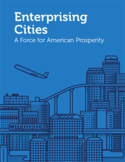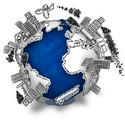The public stock offering by Twitter reflects not only the current bubble in social media stocks, but also the continuing shift in both economic and political power away from Southern California to the San Francisco Bay Area, home to less than one in five state residents. Not since the late 19th century, when San Francisco and its environs dominated the state, has influence been so lopsidedly concentrated in just one region. read more »
Politics
Jerry Brown and California’s “Attractive” Poverty
Jerry Brown is supposed to be a different kind of politician: well informed, smart, slick, and skilled. While he has had some missteps, he's always bounced back. His savvy smarts have allowed him to have a fantastically successful career while generally avoiding the egregious dishonesty that characterizes so many political practitioners. read more »
The Dutch Rethink the Welfare State
When the Netherlands’ newly coronated king made his first annual appearance before parliament, he turned some heads when he addressed the deficiencies of the Dutch welfare state. “Due to social developments such as globalisation and an ageing population, our labour market and public services are no longer suited to the demands of the times”, the king said in a speech written by Liberal prime minister Mark Ruttes cabinet. “The classical welfare state is slowly but surely evolving into a ‘participation society’”, Willem-Alexander continued. By this he meant that the public systems should start encouraging self-reliance over government dependency. read more »
New Report: Enterprising Cities - A Force for American Prosperity
The inaugural edition of Enterprising Cities: A Force for Prosperity that was recently released examines best practices in municipalities taking proactive measures to support job creation and economic growth together with the private sector. The U.S. Chamber of Commerce Foundation’s Enterprising States and Cities program takes an in-depth look at the policies and programs being implemented to promote economic growth at the state and local levels. read more »
- Login to post comments
Fixing California: The Green Gentry’s Class Warfare
Historically, progressives were seen as partisans for the people, eager to help the working and middle classes achieve upward mobility even at expense of the ultrarich. But in California, and much of the country, progressivism has morphed into a political movement that, more often than not, effectively squelches the aspirations of the majority, in large part to serve the interests of the wealthiest. read more »
Bridges Boondoggle, Portland Edition
A couple weeks ago I outlined how the Ohio River Bridges Project in Louisville had gone from tragedy to farce. Basically none of the traffic assumptions from the Environmental Impact Statements that got the project approved are true anymore. According to the investment grade toll study recently performed to set toll rates and sell bonds, total cross river traffic will be 78,000 cars (21.5%) less than projected in the original FEIS. read more »
Bipartisan Distrust of the Beltway
Much has been written and spoken about the deep divide between “red” and “blue” America, but the real chasm increasingly is between Washington and the rest of the country. This disconnect may increase as both conservatives and liberals outside the Beltway look with growing disdain upon their “leaders” inside the imperial capital. Indeed, according to Gallup, trust among Americans toward the federal government has sunk to historic lows, regarding both foreign and domestic policy.
The debate over Syria epitomizes this division. For the most part, Washington has been more than willing to entertain another military venture. This includes the Democratic policy establishment. You see notables like Anne Marie Slaughter and the New York Times' Bill Keller join their onetime rivals among the neoconservative right in railing against resurgent “isolationism” on the Right. read more »
California’s New Feudalism Benefits a Few at the Expense of the Multitude
California has been the source of much innovation, from agribusiness and oil to fashion and the digital world. Historically much richer than the rest of the country, it was also the birthplace, along with Levittown, of the mass-produced suburb, freeways, much of our modern entrepreneurial culture, and of course mass entertainment. For most of a century, for both better and worse, California has defined progress, not only for America but for the world. read more »
Norway Breaks with Social Democracy
Largely uncommented on in the US press, Europe’s long-standing social democratic tilt has changed. During recent years, almost all Western European nations have seen a dramatic fall in support for the traditional Social Democratic parties, which for so long have dominated the political landscapes. In response, the centre-left parties have morphed, moving towards greater emphasis on the benefits of free markets and individual responsibility. In several countries the former communist parties now claim that they fill the role of traditional Social Democrats. read more »
Democratic "Upstairs-Downstairs" Coalition at Risk
Michael Bloomberg's passing from New York City Hall, and his likely replacement as mayor by a fire-breathing populist Democrat, Bill de Blasio, marks a historic shift, not just in urban politics but, potentially, also national politics. For 20 years, under first Rudy Giuliani and then Bloomberg, New Yorkers accepted a form of “trickle down economics” where Wall Street riches flowed into city coffers and kept Gotham, at least on the surface, humming and solvent. read more »
- Login to post comments






















